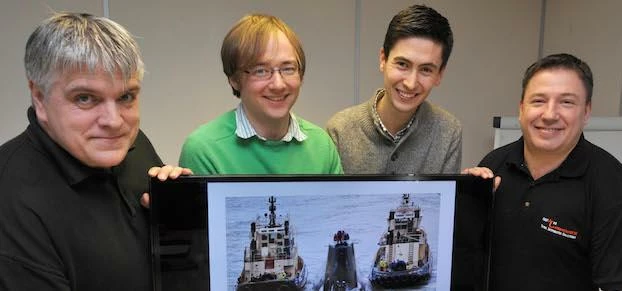
Partner Article
Applied Integration joins forces with Teesside University in two year partnership
Bosses of a Teesside technology business that designs automated systems for nuclear attack submarines are investing in a new scheme that could help them win more major deals.
Applied Integration has joined forces with Teesside University in a two-year Knowledge Transfer Partnership (KTP) designed to encourage businesses to improve their competitive edge through the use of emerging expertise and innovative technologies.
Funded by government grants and sponsorship, KTP is a nationwide programme helping businesses improve their competitiveness and productivity through the better use of the UK’s knowledge, technology and skills-base.
Applied Integration is working with academics within the university’s School of Computing to radically redesign the Stokesley firm’s in-house project development framework.
The project is developing software to streamline Applied Integration’s in-house processes, reducing costs and development time associated with the production of hybrid critical systems.
It will focus on introducing internal processes that ensure client requirements are clearly understood at the very outset of major projects.
The KTP could save Applied Integration – and its customers – substantial time and money, giving the systems integrator a competitive advantage in a challenging and increasingly demanding market.
Specialising in providing cutting edge solutions to a wide range of 21st Century industries, Applied Integration design and develop the automation and control systems for customers in the petrochemicals, oil, gas and defence sectors
Recent winners of the Manufacturing gong at the North East Business Awards, when they were also shortlisted for the second successive year for Teesside Company of the Year, Applied Integration is currently building state-of-the-art, safety-critical control systems for the Royal Navy’s nuclear-powered Astute-class attack submarines.
Leading the university’s team of academics on the project are Dr Peter Gregory, and Dr Joao Ferreira, both senior lecturers and integral members of the university’s Digital Futures Research Institute.
Recent graduate Ali Almohammad has been recruited to work as an associate on the £108,000 KTP, with engineer Phil White supervising the project within Applied Integration.
Director Garry Lofthouse said: “We’re excited about the potential for this collaborative project with Teesside University.
“If it’s as successful as we believe it can be, it will provide us with a business tool that will give us a real advantage over our rivals.
“Clearly, having to do work again because a client’s requirements were not 100% understood and agreed at the outset can have a very significant impact on the time and cost of a project.
“It’s estimated that significant changes made towards the end of a project can multiply 15-fold the amount of work necessary had the changes been made at the outset.
“The commissioning segment of the complex projects we carry out traditionally represents 60% of the overall costs, so accurate, standardised requirements capture - covering the ‘what if’ scenarios through fully automated testing - is the planned outcome from the KTP.
“When you consider that some of our Defence sector projects – on nuclear submarines, for instance – can cover a six-year period, then it’s easy to understand the importance of getting it right from the very start.”
Looking to promote your product/service to SME businesses in your region? Find out how Bdaily can help →
Enjoy the read? Get Bdaily delivered.
Sign up to receive our daily bulletin, sent to your inbox, for free.








 £100,000 milestone drives forward STEM work
£100,000 milestone drives forward STEM work
 Restoring confidence for the economic road ahead
Restoring confidence for the economic road ahead
 Ready to scale? Buy-and-build offers opportunity
Ready to scale? Buy-and-build offers opportunity
 When will our regional economy grow?
When will our regional economy grow?
 Creating a thriving North East construction sector
Creating a thriving North East construction sector
 Why investors are still backing the North East
Why investors are still backing the North East
 Time to stop risking Britain’s family businesses
Time to stop risking Britain’s family businesses
 A year of growth, collaboration and impact
A year of growth, collaboration and impact
 2000 reasons for North East business positivity
2000 reasons for North East business positivity
 How to make your growth strategy deliver in 2026
How to make your growth strategy deliver in 2026
 Powering a new wave of regional screen indies
Powering a new wave of regional screen indies
 A new year and a new outlook for property scene
A new year and a new outlook for property scene